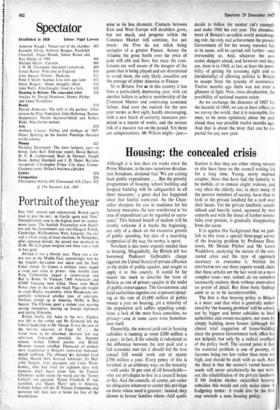Housing: the concealed crisis
Although it is less than six weeks since the Prime Minister, in his now notorious devalua- tion broadcast, declared that 'We are cutting back public expenditure. . . . But the priority programmes of housing, school building and hospital building will be safeguarded in all these measures,' a great deal has happened since that fateful week-end. As the Chan- cellor sharpens his axe in readiness for his January measures, the new watchword is `no area of expenditure can be regarded as sacro- sanct.' This belated breath of realism will be doubly welcome if it marks the beginning, not only of a check on the excessive growth of public spending, but also of a searching reappraisal of the way the money is spent.
Nowhere is this more urgently needed than in housing. Misguidedly, the Britigh left has borrowed Professor Galbraith's charge (against the United States) of private affluence in the midst of public squalor, and sought to apply it to this country. It would be far nearer the mark to describe the state of Britain as one of private squalor in the midst of public extravagance. The Government and local authorities together are at present spend- ing at the rate of £1,000 million of public money a year on housing, yet a minority of the population still suffers' appalling condi- tions, a lack of the most basic amenities, no privacy—and in some cases even homeless- ness itself.
Ostensibly, the amount paid out in housing subsidies is running at some £200 million a a year : in fact, if the subsidy is calculated as the difference between the rent paid and a full economic rent (as it should be) the true annual bill would work out at nearer £750 million a year. Every penny of this is lavished, in an arbitrary way, on the minority —well under 30 per cent of all households— who are privileged to live in a council house or flat. And the councils, of course, are under no obligation whatever to confer this privilege on those whose need is greatest : instead, they choose to favour families whose chief quay fication is that they are either sitting tenants or else have been on the council waiting list for a long time. Young, newly married couples; those that have had the temerity to be mobile, or to remain single; widows, and very often the elderly, too; in short many of the poorest members of society, have thus to look to the private landlord for a roof over their heads. Yet the private landlord, unsub- sidised and heavily taxed, squeezed by rent controls and with the threat of further restric- tions ever present, is gradually disappearing from the scene.
It is against this background that we pub- lish in this issue a special three-page survey of the housing problem by Professor Don- nison, Mr Dennis Pilcher and Mr Lewis Waddilove, analysing the nature of the con- cealed crisis and the type of approach necessary to overcome it. Neither the SPECTATOR nor our three experts would claim that these articles are the last word on a most complex issue—nor, indeed, do we ourselves necessarily endorse them without reservation on points of detail. But three basic findings seem to us to be incontrovertible.
The first is that housing policy in Britain is a mess; and that what is generally under- stood by 'the housing problem' will be solved, not by bigger and better subsidies to local authorities and owner-occupiers, nor even by simply building more houses (although the almost total stagnation of house-building since the present Government took office has not helped), but only by a radical overhaul of the policy itself. The second point is that the essential problem is one of poverty, of incomes being too low rather than rents too high, and should be dealt with as such. And the third is that the nation's varied housing needs will never satisfactorily be met with- out the rehabilitation of the private landlord. If Mr Jenkins slashes unjustified housing subsidies this would not only make sense in budgetary terms: it could also be the first step towards a sane housing policy.










































 Previous page
Previous page